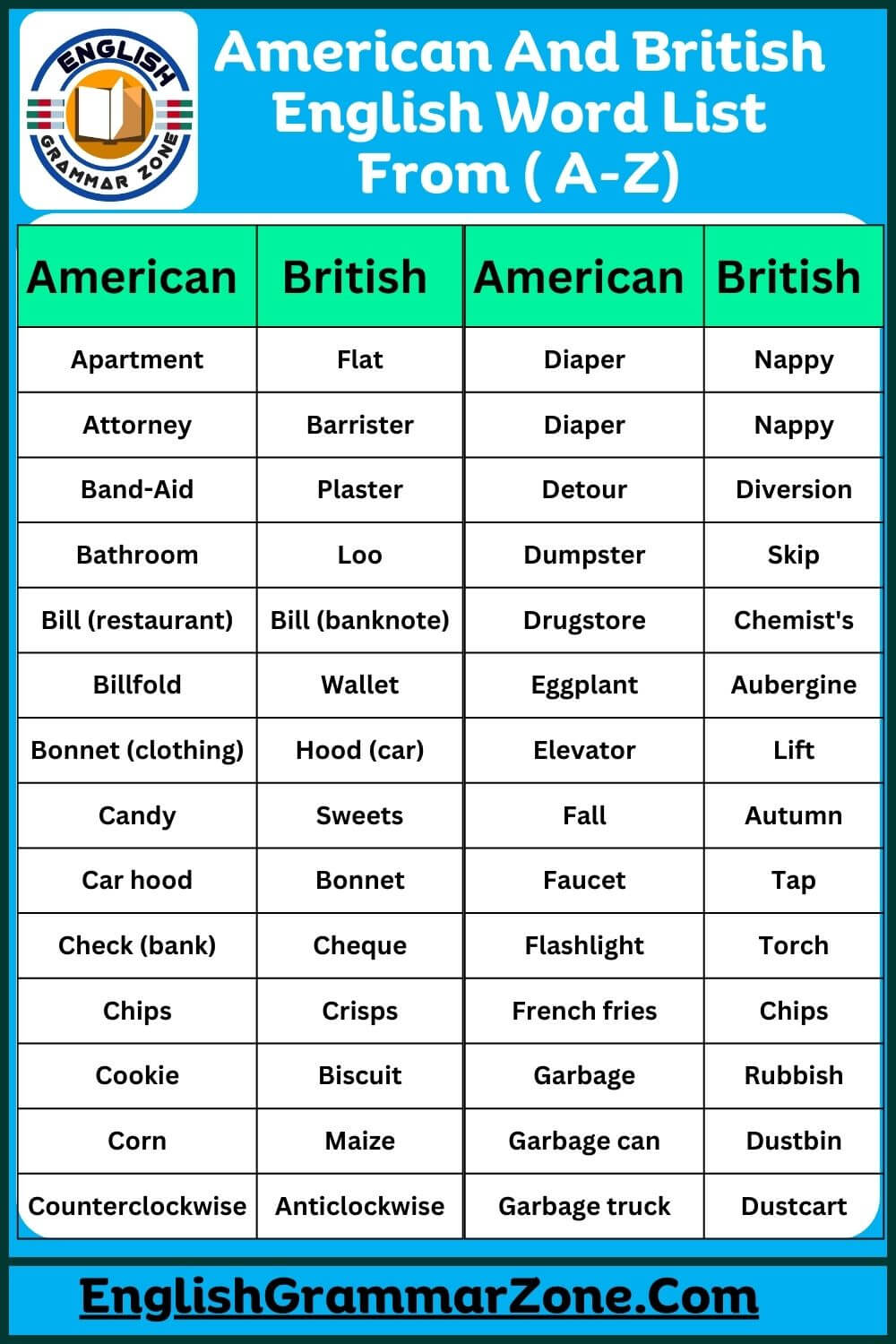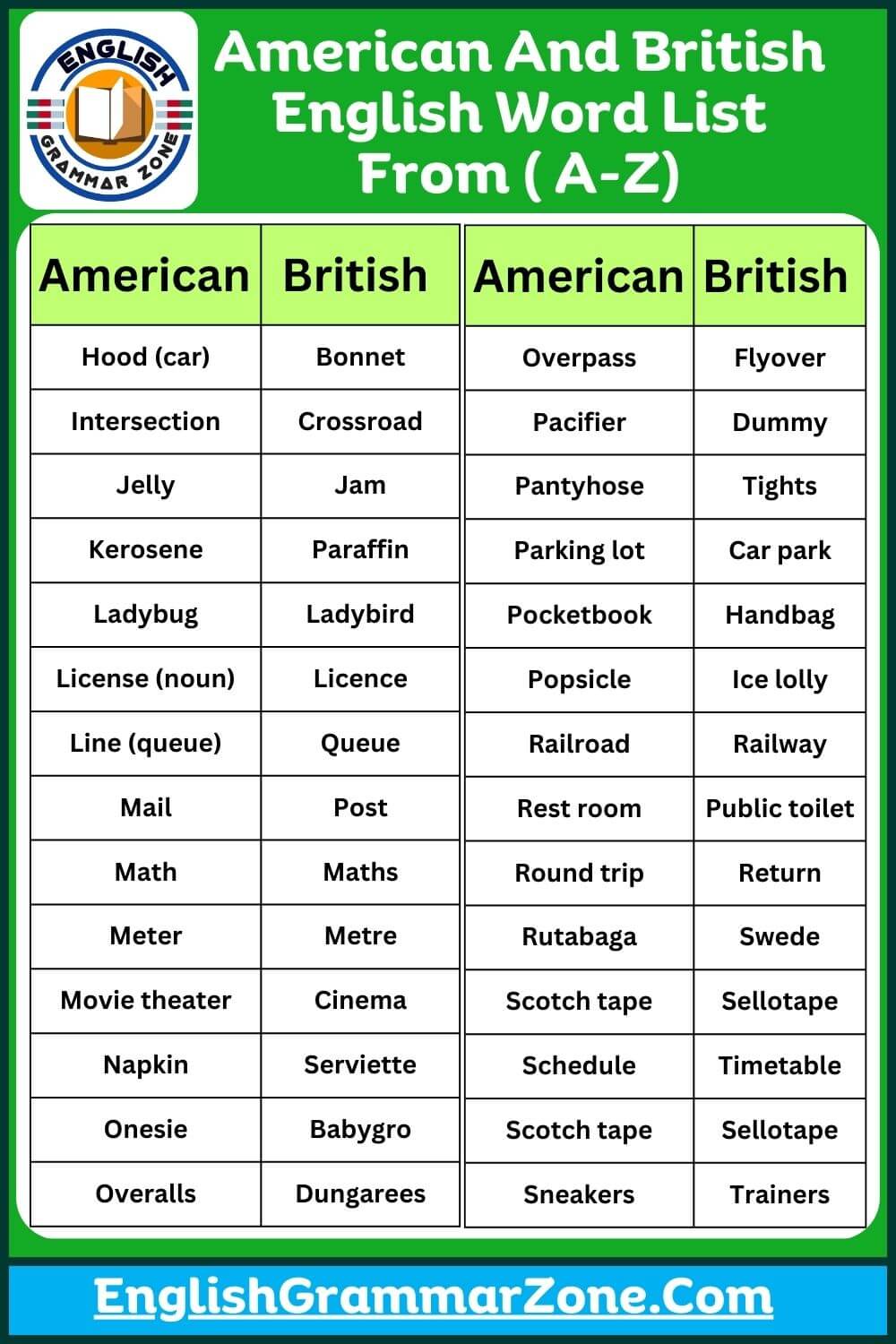Language is a living, evolving entity, and one of the most fascinating aspects of English is how it varies across different regions. Among the most well-known variations are American and British English words. While both forms of English are fundamentally the same, there are key differences in spelling, vocabulary, and even grammar. Understanding these distinctions can help you communicate more effectively and appreciate the unique linguistic styles of both cultures. Whether you’re learning English, traveling, or simply interested in language, recognizing American and British English words can enrich your experience.
In this article, we’ll explore the most common differences between American and British English words, providing examples and explanations for better understanding. By the end, you’ll have a clearer picture of how these two versions of English differ and how to use them correctly depending on where you are.
| American English | British English |
| Apartment | Flat |
| Attorney | Barrister |
| Band-Aid | Plaster |
| Bathroom | Loo |
| Bill (restaurant) | Bill (banknote) |
| Billfold | Wallet |
| Bonnet (clothing) | Hood (car) |
| Candy | Sweets |
| Car hood | Bonnet |
| Check (restaurant) | Bill |
| Check (bank) | Cheque |
| Chips | Crisps |
| Cookie | Biscuit |
| Corn | Maize |
| Counterclockwise | Anticlockwise |
| Cotton candy | Candyfloss |
| Diaper | Nappy |
| Diaper | Nappy |
| Detour | Diversion |
| Dumpster | Skip |
| Drugstore | Chemist’s |
| Eggplant | Aubergine |
| Elevator | Lift |
| Fall | Autumn |
| Faucet | Tap |
| Flashlight | Torch |
| French fries | Chips |
| Garbage | Rubbish |
| Garbage can | Dustbin |
| Garbage truck | Dustcart |
| Gasoline | Petrol |
| Hood (car) | Bonnet |
| Intersection | Crossroad |
| Jelly | Jam |
| Kerosene | Paraffin |
| Ladybug | Ladybird |
| Lawyer | Solicitor/Barrister |
| License (noun) | Licence |
| Line (queue) | Queue |
| Post |
| Math | Maths |
| Median strip | Central reservation |
| Meter | Metre |
| Movie theater | Cinema |
| Napkin | Serviette |
| Onesie | Babygro |
| Overalls | Dungarees |
| Overpass | Flyover |
| Pacifier | Dummy |
| Pantyhose | Tights |
| Parking lot | Car park |
| Pocketbook | Handbag |
| Popsicle | Ice lolly |
| Railroad | Railway |
| Rest room | Public toilet |
| Round trip | Return |

| Rutabaga | Swede |
| Scotch tape | Sellotape |
| Schedule | Timetable |
| Scotch tape | Sellotape |
| Sneakers | Trainers |
| Soccer | Football |
| Stove | Cooker |
| Suspenders | Braces |
| Sweater | Jumper |
| Timetable | Schedule |
| Track (railroad) | Rail |
| Trunk (car) | Boot |
| Truck | Lorry |
| Turnpike | Toll road |
| Underwear | Pants |
| Vacation | Holiday |
| Vest | Waistcoat |
| Windshield | Windscreen |
| Yard | Garden |
| Zipper | Zip |
| Zucchini | Courgette |

FAQ about American and British English Words
1. What are the most common American and British English differences?
The most common differences include vocabulary (e.g., “apartment” vs. “flat”), spelling (e.g., “colour” vs. “color”), and sometimes grammar. While both versions of English are widely understood, it’s important to be aware of these distinctions depending on where you are or whom you’re communicating with.
2. Why do American and British English words differ?
The differences originated from historical, cultural, and regional influences. Noah Webster, a key figure in American English, standardized spelling to make it more phonetic, while British English preserved many of its historical spellings. Over time, other factors like globalization and regional developments led to further distinctions.
3. Is it wrong to use British words in American English?
It’s not wrong, but it can cause confusion if you’re speaking with someone who is used to American English. It’s important to consider your audience and the context in which you’re communicating. For example, if you’re speaking to someone in the UK, using “flat” instead of “apartment” would be more natural.
4. Can I mix American and British English in the same conversation?
It’s best to stick to one version of English in a conversation to avoid confusion. However, mixing both can happen naturally when you’re aware of both variations. Just try to be consistent with your vocabulary and spelling.
5. Which is better, American or British English?
Neither is better than the other—they’re simply different. The version of English you choose depends on your location, the audience you’re addressing, and your personal preference. Some people learn both, while others may prefer one over the other.
Conclusion
Understanding the differences between American and British English words can make you a more effective communicator, whether you’re traveling, learning, or working internationally. While both versions of English share a common foundation, it’s important to recognize and adapt to their differences in spelling, vocabulary, and usage. By doing so, you’ll gain a deeper appreciation for the rich diversity of the English language.

